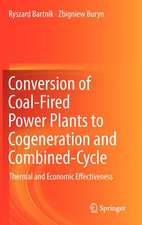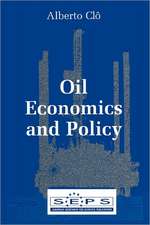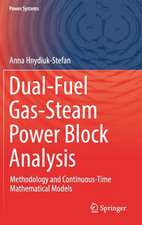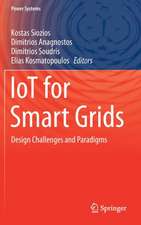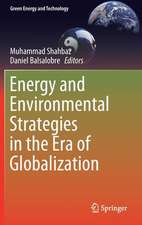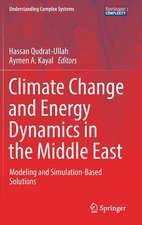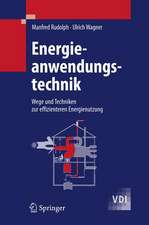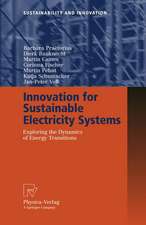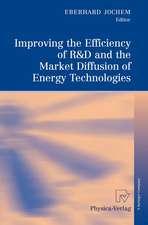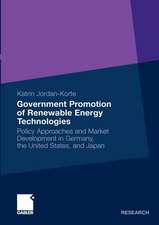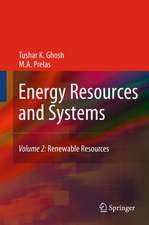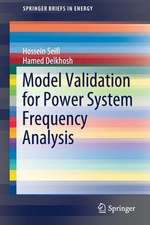Solving Problems in Thermal Engineering: A Toolbox for Engineers: Power Systems
Autor Viktor Józsa, Róbert Kovácsen Limba Engleză Paperback – 6 noi 2020
Written for a wide audience, from beginner to senior engineers and physicists, it provides a comprehensive framework covering theory and practice and including numerous fundamental and real-world examples. Based on the thermodynamics of various material laws, it focuses on the mathematical structure of the continuum models and their experimental validation. In addition to several examples in renewable energy, it also presents thermal processes in space, and summarizes size-dependent, non-Fourier, and non-Fickian problems, which have increasing practical relevance in, e.g., the semiconductor industry. Lastly, the book discusses the key aspects of numerical methods, particularly highlighting the role of boundary conditions in the modeling process.
The book provides readers with a comprehensive toolbox, addressing a wide variety of topics in thermal modeling, from constructing material laws to designing advanced power plants and engineering systems.
| Toate formatele și edițiile | Preț | Express |
|---|---|---|
| Paperback (1) | 467.28 lei 6-8 săpt. | |
| Springer International Publishing – 6 noi 2020 | 467.28 lei 6-8 săpt. | |
| Hardback (1) | 642.83 lei 6-8 săpt. | |
| Springer International Publishing – 6 noi 2019 | 642.83 lei 6-8 săpt. |
Din seria Power Systems
- 18%
 Preț: 953.13 lei
Preț: 953.13 lei - 18%
 Preț: 783.98 lei
Preț: 783.98 lei - 20%
 Preț: 1002.47 lei
Preț: 1002.47 lei - 18%
 Preț: 1021.86 lei
Preț: 1021.86 lei - 18%
 Preț: 897.65 lei
Preț: 897.65 lei - 18%
 Preț: 788.72 lei
Preț: 788.72 lei - 18%
 Preț: 734.27 lei
Preț: 734.27 lei - 18%
 Preț: 902.36 lei
Preț: 902.36 lei -
 Preț: 563.49 lei
Preț: 563.49 lei - 18%
 Preț: 955.08 lei
Preț: 955.08 lei - 18%
 Preț: 946.87 lei
Preț: 946.87 lei - 18%
 Preț: 950.52 lei
Preț: 950.52 lei - 18%
 Preț: 949.23 lei
Preț: 949.23 lei - 15%
 Preț: 641.85 lei
Preț: 641.85 lei - 18%
 Preț: 1116.26 lei
Preț: 1116.26 lei - 18%
 Preț: 961.10 lei
Preț: 961.10 lei - 18%
 Preț: 1386.17 lei
Preț: 1386.17 lei - 15%
 Preț: 639.59 lei
Preț: 639.59 lei - 15%
 Preț: 641.03 lei
Preț: 641.03 lei - 18%
 Preț: 2497.51 lei
Preț: 2497.51 lei - 18%
 Preț: 957.62 lei
Preț: 957.62 lei - 18%
 Preț: 1229.91 lei
Preț: 1229.91 lei - 15%
 Preț: 643.34 lei
Preț: 643.34 lei - 18%
 Preț: 957.09 lei
Preț: 957.09 lei - 18%
 Preț: 1231.47 lei
Preț: 1231.47 lei - 15%
 Preț: 698.30 lei
Preț: 698.30 lei - 18%
 Preț: 953.20 lei
Preț: 953.20 lei - 15%
 Preț: 640.88 lei
Preț: 640.88 lei - 15%
 Preț: 634.18 lei
Preț: 634.18 lei - 18%
 Preț: 955.08 lei
Preț: 955.08 lei - 18%
 Preț: 1241.73 lei
Preț: 1241.73 lei - 18%
 Preț: 952.09 lei
Preț: 952.09 lei - 18%
 Preț: 946.55 lei
Preț: 946.55 lei - 18%
 Preț: 961.86 lei
Preț: 961.86 lei - 18%
 Preț: 944.19 lei
Preț: 944.19 lei - 18%
 Preț: 1110.72 lei
Preț: 1110.72 lei - 15%
 Preț: 642.03 lei
Preț: 642.03 lei - 15%
 Preț: 636.12 lei
Preț: 636.12 lei - 18%
 Preț: 1114.83 lei
Preț: 1114.83 lei - 15%
 Preț: 639.90 lei
Preț: 639.90 lei - 18%
 Preț: 957.32 lei
Preț: 957.32 lei - 18%
 Preț: 1235.57 lei
Preț: 1235.57 lei - 18%
 Preț: 959.19 lei
Preț: 959.19 lei
Preț: 467.28 lei
Preț vechi: 549.74 lei
-15% Nou
Puncte Express: 701
Preț estimativ în valută:
89.42€ • 92.79$ • 74.74£
89.42€ • 92.79$ • 74.74£
Carte tipărită la comandă
Livrare economică 17-31 martie
Preluare comenzi: 021 569.72.76
Specificații
ISBN-13: 9783030334772
ISBN-10: 3030334775
Pagini: 203
Ilustrații: XV, 203 p. 85 illus., 44 illus. in color.
Dimensiuni: 155 x 235 mm
Greutate: 0.31 kg
Ediția:1st ed. 2020
Editura: Springer International Publishing
Colecția Springer
Seria Power Systems
Locul publicării:Cham, Switzerland
ISBN-10: 3030334775
Pagini: 203
Ilustrații: XV, 203 p. 85 illus., 44 illus. in color.
Dimensiuni: 155 x 235 mm
Greutate: 0.31 kg
Ediția:1st ed. 2020
Editura: Springer International Publishing
Colecția Springer
Seria Power Systems
Locul publicării:Cham, Switzerland
Cuprins
Introduction.- General aspects of thermal processes.- Scaling of thermal processes.- Applications of Renewable Energy.- Thermal processes in vacuum.- Non-Fourier and Non-Fick problems.- Solution methods.
Notă biografică
Róbert Kovács’ research focuses on continuum thermodynamics and modeling problems of non-classical phenomena of heat conduction and rheology toward the development of numerical and analytical mathematical tools of thermodynamic equations. He is involved in various industrial projects concering modeling drying processes and analyzing thermal behaviors.
Viktor Józsa:Viktor Józsa’s main field of research is liquid fuel combustion. In addition to teaching numerical simulation and heat engine-related subjects, he is involved in industrial projects to investigate thermal problems. Partner companies include Siemens, General Electric, and Alstom, as wellas other international and national corporations in the energy sector. He designed the complete framework of the PocketQube-class satellite, the SMOG-1.
Both authors are Assistant Professors at the Budapest University of Technology and Economics, Faculty of Mechanical Engineering.
Textul de pe ultima copertă
This book provides general guidelines for solving thermal problems in the fields of engineering and natural sciences.
Written for a wide audience, from beginner to senior engineers and physicists, it provides a comprehensive framework covering theory and practice and including numerous fundamental and real-world examples. Based on the thermodynamics of various material laws, it focuses on the mathematical structure of the continuum models and their experimental validation. In addition to several examples in renewable energy, it also presents thermal processes in space, and summarizes size-dependent, non-Fourier, and non-Fickian problems, which have increasing practical relevance in, e.g., the semiconductor industry. Lastly, the book discusses the key aspects of numerical methods, particularly highlighting the role of boundary conditions in the modeling process.
The book provides readers with a comprehensive toolbox, addressing a wide variety of topics in thermal modeling, from constructing material laws to designing advanced power plants and engineering systems.
Written for a wide audience, from beginner to senior engineers and physicists, it provides a comprehensive framework covering theory and practice and including numerous fundamental and real-world examples. Based on the thermodynamics of various material laws, it focuses on the mathematical structure of the continuum models and their experimental validation. In addition to several examples in renewable energy, it also presents thermal processes in space, and summarizes size-dependent, non-Fourier, and non-Fickian problems, which have increasing practical relevance in, e.g., the semiconductor industry. Lastly, the book discusses the key aspects of numerical methods, particularly highlighting the role of boundary conditions in the modeling process.
The book provides readers with a comprehensive toolbox, addressing a wide variety of topics in thermal modeling, from constructing material laws to designing advanced power plants and engineering systems.
Caracteristici
Provides a comprehensive toolbox to enable engineers to understand and solve problems in thermal energy Presents all the necessary theoretical knowledge and practical techniques Includes numerous illustrations describing the book’s concepts



